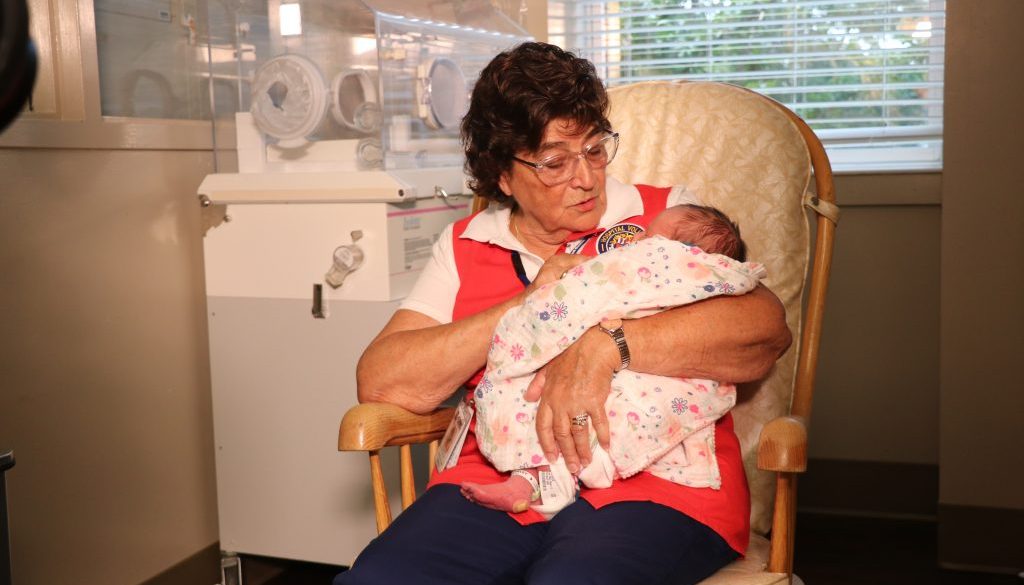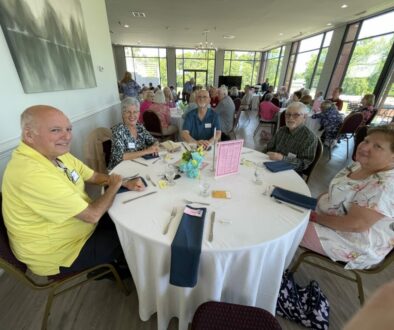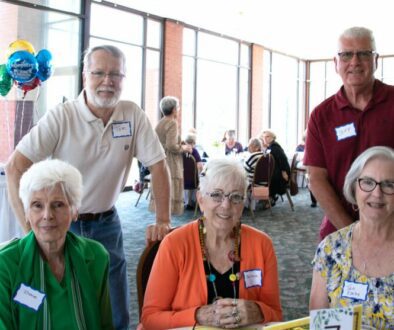Cuddlers on Call: Volunteers helping babies with involuntary drug addictions
By Anjali Patal – WPDE ABC 15 News
CONWAY, S.C. (WPDE) — Joyce McIntyre doesn’t technically work at Conway Medical Center, but most days, she’s there bright and early, ready to swaddle, snuggle and cuddle. “If they call me on emergency, I’d be right here,” McIntyre said. She’s a cuddler. She helps nurses in the newborn nursery by changing diapers, feeding babies, restocking the unit with supplies, and of course – cuddling. It’s a volunteer service that doctors at CMC say is vital. Almost 1,300 babies are born at Conway Medical Center every year, and the nursery has a staff of about 82 people.
Kathy Wade, the Clinical Coordinator for the newborn nursery, said it’s not always easy for the nurses to get to every baby as soon as it begins crying. “Part of the newborn being able to bond with humans is having their needs met in a timely manner when they’re babies,” Wade said. That’s where the cuddlers come in. “They love on the babies, they help us feed them, they hold them. There’s that voice interaction, that touch that helps babies develop normally,” she said. Wade said the cuddlers are especially helpful with the babies that need a little extra love and care. She said many people forget that babies, too, can be victims of the opioid epidemic.
According to the S.C. Office of Revenue and Fiscal Affairs, 13 in every thousand babies born in Horry County in 2018 were born with a drug addiction, or Neonatal Abstinence Syndrome (NAS). According to the Centers for Disease Control and Prevention, NAS “is a withdrawal syndrome that can occur in newborns exposed to certain substances, including opioids, during pregnancy.” For the last four years, Horry County has had the highest rate of babies born with NAS in the entire state. However, Wade said she thinks many cases of NAS go unreported. She said every week, about two to three babies born at CMC have NAS.
She said for babies born with drug addictions, their suffering begins from the moment they enter this world. “We frequently have babies who are born with drugs in their system and it takes a while for them to get it out of their system. So during that time, they’re uncomfortable. They’re in pain, they’re highly sensitive to sound and noise, and some of them are highly sensitive to touch at first,” Wade said. “But after we begin the medication treatments, then they crave the touch, they want to be held and cuddled and fed, and the volunteers help so much with that. They need that constant attention.”
McIntyre said it breaks her heart to see babies born with an addiction they are not responsible for. “A lot of times you just have to sit with them, and try to hold them and rock them and just keep them as comfortable as possible,” McIntyre said. Wade said many of those drug-addicted babies even have to stay at the hospital for an extended period of time. “We had one here for so long, one of the nurses said, ‘Just tell the school bus to stop by and pick it up.’ And its just so darn hard to have a baby here that long,” McIntyre said.
Volunteers like McIntyre spend about 40,000 hours a year at the hospital – a service that would cost CMC about $800,000. Director of Volunteer Services, Carol Biagini, said the cuddler program is the most popular among volunteers. Right now, they have 25 cuddlers and plenty more on a waiting list. Biagini said it’s not just the babies who benefit from the cuddling. She said the cuddler program’s popularity is a result of Horry County’s huge population of retirees. “A lot of them have left their families either in the northern states or in the western states. They don’t see a lot of their grandchildren, so they want that cuddle time,” Biagini said. Like many in the area, McIntyre is retired and her grandchildren live far away. She said cuddling at CMC is a rewarding way for her to spend her free time. “We have a lot of people that have a lot of time on their hands. I’d like to use it wisely if I could,” McIntyre said.
Conway Medical Center’s cuddler program is full, but they do need volunteers for other programs.
Repost of story published by WPDE on November 19, 2019 by Anjali Patel




